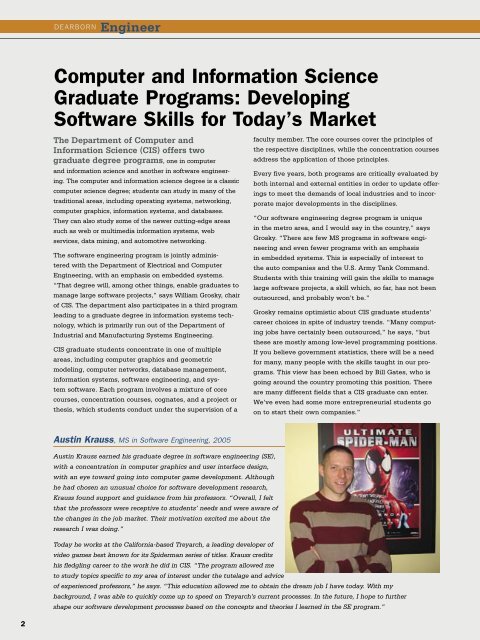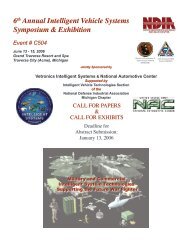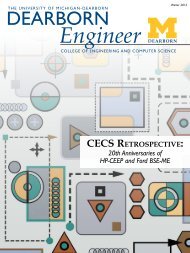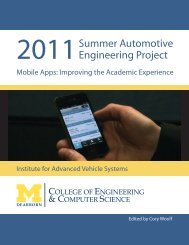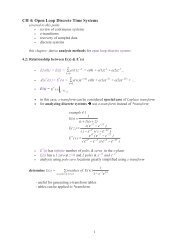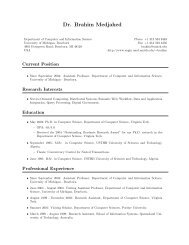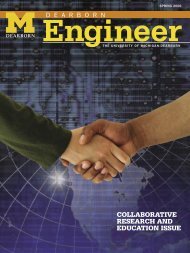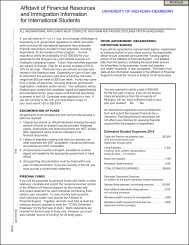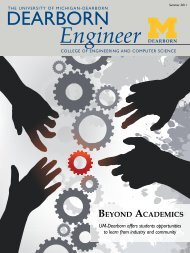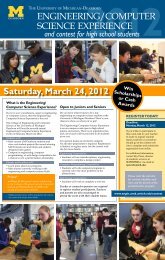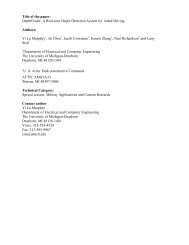Dearborn Engineer, Fall 2005 - College of Engineering & Computer ...
Dearborn Engineer, Fall 2005 - College of Engineering & Computer ...
Dearborn Engineer, Fall 2005 - College of Engineering & Computer ...
Create successful ePaper yourself
Turn your PDF publications into a flip-book with our unique Google optimized e-Paper software.
DEARBORN <strong>Engineer</strong><br />
<strong>Computer</strong> and Information Science<br />
Graduate Programs: Developing<br />
S<strong>of</strong>tware Skills for Today’s Market<br />
The Department <strong>of</strong> <strong>Computer</strong> and<br />
Information Science (CIS) <strong>of</strong>fers two<br />
graduate degree programs, one in computer<br />
and information science and another in s<strong>of</strong>tware engineering.<br />
The computer and information science degree is a classic<br />
computer science degree; students can study in many <strong>of</strong> the<br />
traditional areas, including operating systems, networking,<br />
computer graphics, information systems, and databases.<br />
They can also study some <strong>of</strong> the newer cutting-edge areas<br />
such as web or multimedia information systems, web<br />
services, data mining, and automotive networking.<br />
The s<strong>of</strong>tware engineering program is jointly administered<br />
with the Department <strong>of</strong> Electrical and <strong>Computer</strong><br />
<strong>Engineer</strong>ing, with an emphasis on embedded systems.<br />
“That degree will, among other things, enable graduates to<br />
manage large s<strong>of</strong>tware projects,” says William Grosky, chair<br />
<strong>of</strong> CIS. The department also participates in a third program<br />
leading to a graduate degree in information systems technology,<br />
which is primarily run out <strong>of</strong> the Department <strong>of</strong><br />
Industrial and Manufacturing Systems <strong>Engineer</strong>ing.<br />
CIS graduate students concentrate in one <strong>of</strong> multiple<br />
areas, including computer graphics and geometric<br />
modeling, computer networks, database management,<br />
information systems, s<strong>of</strong>tware engineering, and system<br />
s<strong>of</strong>tware. Each program involves a mixture <strong>of</strong> core<br />
courses, concentration courses, cognates, and a project or<br />
thesis, which students conduct under the supervision <strong>of</strong> a<br />
faculty member. The core courses cover the principles <strong>of</strong><br />
the respective disciplines, while the concentration courses<br />
address the application <strong>of</strong> those principles.<br />
Every five years, both programs are critically evaluated by<br />
both internal and external entities in order to update <strong>of</strong>ferings<br />
to meet the demands <strong>of</strong> local industries and to incorporate<br />
major developments in the disciplines.<br />
“Our s<strong>of</strong>tware engineering degree program is unique<br />
in the metro area, and I would say in the country,” says<br />
Grosky. “There are few MS programs in s<strong>of</strong>tware engineering<br />
and even fewer programs with an emphasis<br />
in embedded systems. This is especially <strong>of</strong> interest to<br />
the auto companies and the U.S. Army Tank Command.<br />
Students with this training will gain the skills to manage<br />
large s<strong>of</strong>tware projects, a skill which, so far, has not been<br />
outsourced, and probably won’t be.”<br />
Grosky remains optimistic about CIS graduate students’<br />
career choices in spite <strong>of</strong> industry trends. “Many computing<br />
jobs have certainly been outsourced,” he says, “but<br />
these are mostly among low-level programming positions.<br />
If you believe government statistics, there will be a need<br />
for many, many people with the skills taught in our programs.<br />
This view has been echoed by Bill Gates, who is<br />
going around the country promoting this position. There<br />
are many different fields that a CIS graduate can enter.<br />
We’ve even had some more entrepreneurial students go<br />
on to start their own companies.”<br />
Austin Krauss, MS in S<strong>of</strong>tware <strong>Engineer</strong>ing, <strong>2005</strong><br />
Austin Krauss earned his graduate degree in s<strong>of</strong>tware engineering (SE),<br />
with a concentration in computer graphics and user interface design,<br />
with an eye toward going into computer game development. Although<br />
he had chosen an unusual choice for s<strong>of</strong>tware development research,<br />
Krauss found support and guidance from his pr<strong>of</strong>essors. “Overall, I felt<br />
that the pr<strong>of</strong>essors were receptive to students’ needs and were aware <strong>of</strong><br />
the changes in the job market. Their motivation excited me about the<br />
research I was doing.”<br />
Today he works at the California-based Treyarch, a leading developer <strong>of</strong><br />
video games best known for its Spiderman series <strong>of</strong> titles. Krauss credits<br />
his fledgling career to the work he did in CIS. “The program allowed me<br />
to study topics specific to my area <strong>of</strong> interest under the tutelage and advice<br />
<strong>of</strong> experienced pr<strong>of</strong>essors,” he says. “This education allowed me to obtain the dream job I have today. With my<br />
background, I was able to quickly come up to speed on Treyarch’s current processes. In the future, I hope to further<br />
shape our s<strong>of</strong>tware development processes based on the concepts and theories I learned in the SE program.”<br />
2


